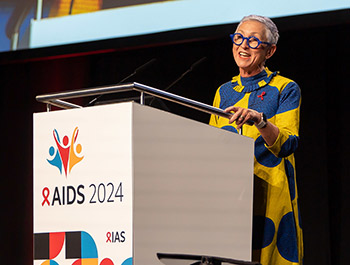Next-Generation PrEP
A twice-yearly injectable—lenacapavir—has been shown to be 100% effective at preventing HIV infection among cisgender women and girls
Currently, PrEP (pre-exposure prophylaxis), a biomedical HIV prevention tool, is only available as a daily pill taken once a day or by injection every two months, and, although this form is 99% effective for people at risk of HIV through sexual activity, uptake has been slow among cisgender women globally. Issues around adherence and persistent use of PrEP have also hindered prevention efforts.

Now, lenacapavir, an antiretroviral administered twice a year by injection, may have the potential to revolutionize HIV prevention among populations vulnerable to HIV infection, including cisgender women.
The need is urgent. Around the world, women and adolescent girls bear the highest burden of HIV, accounting for 53% of all people living with HIV. In 2023, 4,000 adolescent girls and young women aged 15–24 years acquired HIV every week, with 3,100 of these infections occurring in sub-Saharan Africa.
At AIDS 2024 in late July, Dr. Linda-Gail Bekker, director of the Desmond Tutu HIV Center at the University of Cape Town, South Africa, and former president of the International AIDS Society, presented the results of a clinical trial (PURPOSE 1) testing the efficacy of the long-acting injectable to an enthusiastic audience. Lenacapavir demonstrated 100% efficacy, with participants injected with the drug registering zero infections.
The PURPOSE-1 trial was a phase 3, double-blind, randomized controlled study that enrolled 5,338 cisgender adolescent girls and young women in Uganda and South Africa. Alongside the lenacapavir arm, the trial tested two more established form of PrEP—Descovy and Truvada. Though all participants received some form of PrEP, they were also were given the alternate subcutaneous or oral placebo. The trial was funded by Gilead Sciences, maker of all three biomedical agents.
Fifty-five infections occurred among participants, but none of them were in the arm receiving twice-yearly lenacapavir. It should be noted that adherence to lenacapavir was extremely high, while adherence to Truvada and Descovy was low. The superior efficacy of lenacapavir, determined by interim analysis results, prompted researchers to end the trial early in June 2024, and participants in the Descovy and Truvada arms were offered lenacapavir.
The PURPOSE 1 trial tested not only a next-generation biomedical agent but also a next-generation clinical trial design. Multiple stakeholder meetings were held to gather input about trial design from those who could benefit from PrEP. As a result, community advocates from Uganda and South Africa, and elsewhere, successfully pushed for inclusion of adolescents and young people, as well as pregnant and lactating women (PURPOSE 1 was the first HIV prevention trial to intentionally include this latter group).
Dr. Bekker commented on the trial design in a prepared release: “PURPOSE 1 also sets a new standard for person-centered HIV prevention trials, demonstrating what can happen when a thoughtful scientific and community-focused trial design, a promising drug candidate and an inclusive trial implementation plan come together.”
PURPOSE 2 is now assessing lenacapavir for PrEP among cisgender men, transgender men, transgender women, and gender non-binary individuals who have sex with partners assigned male at birth in Argentina, Brazil, Mexico, Peru, South Africa, Thailand, and the United States. Results are expected in late 2024 or early 2025.
Share This:
